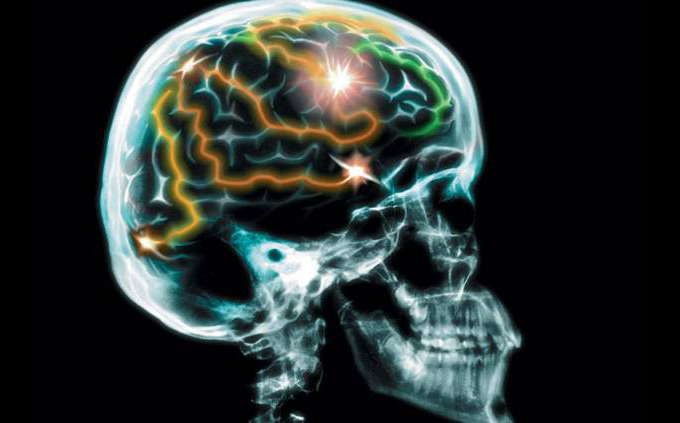
Stress is crippling. It impairs creativity and cognitive performance, decreases athletic performance, increases inflammation and (obviously) just makes you feel like shit. Reducing the effects of stress on your body is one of the most consistent and effective ways to improve energy levels, mental clarity and physical performance.
Stress affects a huge number of systems in the body, but it is the adrenals that are generally the hardest hit. Stress triggers the adrenals to constantly pump out large amounts of cortisol, epinephrine and norepinephrine. Demand often exceeds the sustainable supply - and adrenal fatigue is the inevitable outcome.
Making major changes to lifestyle habits over time (more on this here) is the only way to make big, lasting changes in stress levels - and see the improvements in adrenal function that come with it.
There are, however, a few tools we can use to accelerate the process. There are a handful of supplements out there that effectively reduce the impact of stress on the adrenals. If you are suffering from full-blown adrenal fatigue, these supplements will help you get out of adrenal "debt" where the demands placed on the adrenals are greater than the amount of adrenal hormone they can sustainably produce and secrete. This is the first step in healing your adrenals and moving on from chronic adrenal fatigue.
If you're someone with better-managed stress levels and reasonably healthy adrenals, there's still a lot to be gained from the supplements listed here. Even well-managed stress places persistent low-level demands on the adrenal glands, sapping their power away from the functions you want them to be fully "charged" for. Fully healthy, vital adrenals is a big component of achieving exceptional energy levels, improving performance and generally feeling awesome as much of the time as possible.
1. Ashwagandha (Withandia Somnifera)

Ashwagandha root is a tool treasured by Ayurvedic practitioners for hundreds (perhaps thousands) of years. In this Indian system of medicine, ashwagandha is used to treat everything from low-energy to depression.
Among today’s natural health practitioners, ashwagandha has become a highly regarded adaptogen. In contrast to western allopathic medicines, which have a highly-specific mechanism of action in the body, an adaptogen broadly modulates the endocrine system to bring the body into a state of equilibrium.
In recent years, researchers have done studies on the chemical composition of ashwagandha and learned that it contains several compounds (called “withanolides”) that are structurally similar to our body’s own glucocorticoid hormones, including cortisol. Withanolides interact with glucocorticoid receptors in the body, producing the effects we observe with ashwagandha supplementation. [1]
Research subjects given oral doses of ashwagandha show lower cortisol levels, reduced adrenal weight and a reduction in the magnitude of blood sugar fluctuations. All three of these indicate both lower demand on the adrenals and and a reduced stress response.
Organic powdered ashwagandha root is available widely, including on Amazon.
I recommend cycling ashwagandha usage so as to maximize the benefits delivered to the body. Uninterrupted use of adaptogens often leads to receptors becoming desensitized to the active compounds, diminishing the effects over time. 3 weeks of continuous usage followed by one week off will maximize the benefits of ashwagandha for most people.
Start with 1g per day and work your way up to 2-4g daily.
2. L-Theanine

L-Theanine is a natural compound found in green and black teas. It is absent from coffee, however, and helps explain why the caffeine high from tea is often calmer and more balanced than the high from coffee for most people.
L-Theanine is fascinating from a biochemical perspective in that the effects on the brain and nervous system are so diverse. Rats given doses of L-Theanine show increased levels of serotonin and dopamine, as well as inhibitory neurotransmitter glycine.
That’s not all. L-Theanine also has been shown to block the binding of neurotransmitter L-glutamic acid to receptors in the brain. L-glutamic acid is one of the brain’s primary excitatory neurotransmitters, so blocking its action has an anxiety-relieving effect.
Test subjects given doses of L-Theanine consistently show an attenuated stress response and increases time spent in Alpha brain wave states (commonly associated with relaxation). [2]
L-Theanine can be taken either daily or exclusively on days when productivity or stress reduction are a priority. The mechanism of action makes tolerance unlikely, so there is no need to cycle as is recommended to do with ashwagandha.
L-Theanine can be difficult to find in stores, so Amazon is likely the best bet.
Start with a dosage of around 200mg and experiment with dosages up to 500mg to find your personal ideal dosage.
3. Picamilon (nicotinoyl-GABA)
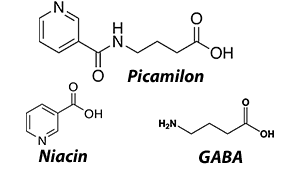
The mechanism of action of picamilon is considerably more straightforward than the other supplements listed here.
Our brain’s primary inhibitory neurotransmitter system is the gamma-aminobutyric-acid (GABA) system. When this system is activated (generally by the neurotransmitter GABA), we experience calm, relaxation and most importantly - an attenuated stress response.
If this sounds familiar, it’s because the GABA system is the primary neurochemical system acted on by alcohol (not recommended as a stress-reducing supplement).
If we consume "plain" GABA in supplement supplement, very little of it makes it across the blood brain barrier into our brains. Picamilon addresses this issue by binding a GABA molecule to a molecule of vitamin B3 (niacin). This addition changes the biomechanics of the substance, allowing a large percentage of it to cross into the brain. Once in the brain, it is hydrolyzed (split) into a molecule of GABA and a molecule of B3.
The calming effect of picamilon is significant, and for this reason it should be approached with caution. Some people can get away with taking it daily without any adverse effects, while others will experience “rebound stress” the day following several consecutive days of use. You can experiment and figure out which camp you fall into, but I’d recommend being conservative until you learn your body’s response.
My personal opinion is that picamilon is most effective when reserved for either days you anticipate being high-stress, or days when your planned activities require a high degree of focus and creativity (nothing inhibits focus and creativity like stress).
Picamilon is also somewhat difficult to find in stores, but is available on Amazon.
Start with a dose of around 50mg, working up to 150mg until you find your optimal dose.
4. EPA and DHA
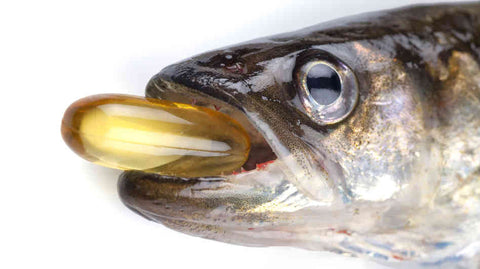
EPA and DHA are the two active forms of Omega 3 essential fatty acids our body requires. There’s a lot of reasons to be taking EPA and DHA daily - these fatty acids are essential components of cell receptors throughout the body, particularly in the brain. EPA and DHA also have an anti-inflammatory effect by decreasing synthesis of pro-inflammatory cytokines.
When used strategically, these essential fatty acids can also have a powerful adrenal-protective effect. A 2003 study showed that men taking 7.2g of fish oil (a source of EPA and DHA) per day for 3 weeks showed significantly blunted cortisol and epinephrine spikes in response to stressors. [3]
This is a larger dose than is generally required for normal dietary supplementation, but it appears the stress-reducing therapeutic effects only become significant at these higher doses.
When choosing a fish oil, sourcing is very important. Many cheaper fish oils can be contaminated with heavy metals and PCBs (endocrine-disrupting industrial chemicals). Choosing a high-quality fish oil from deep-water norwegian or arctic fish will greatly reduce this risk. Carlson and Norwegian Naturals are two well-respected brands.
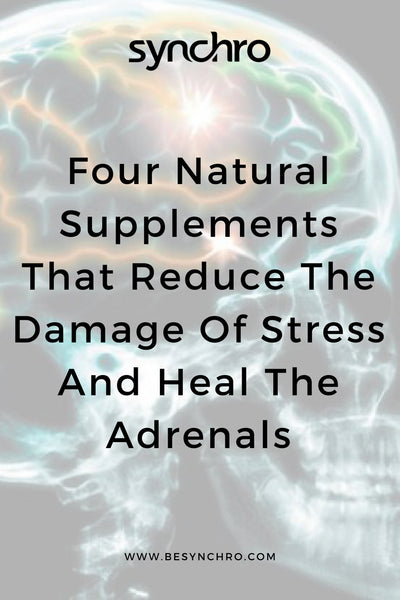 __________________________________________________________
__________________________________________________________
[1] http://www.altmedrev.com/publications/5/4/334.pdf
[2] http://www.ncbi.nlm.nih.gov/pubmed/16930802
[3] http://www.sciencedirect.com/science/article/pii/S1262363607700393__________________________________________________________
Looking For More On Supplementation? Check out:
Top 3 Critical Vitamin + Mineral Supplements (Supplementation Series - Part 2 of 3)
Fixing Your Nutrient Deficiencies (Supplementation Series - Part 3 of 3)
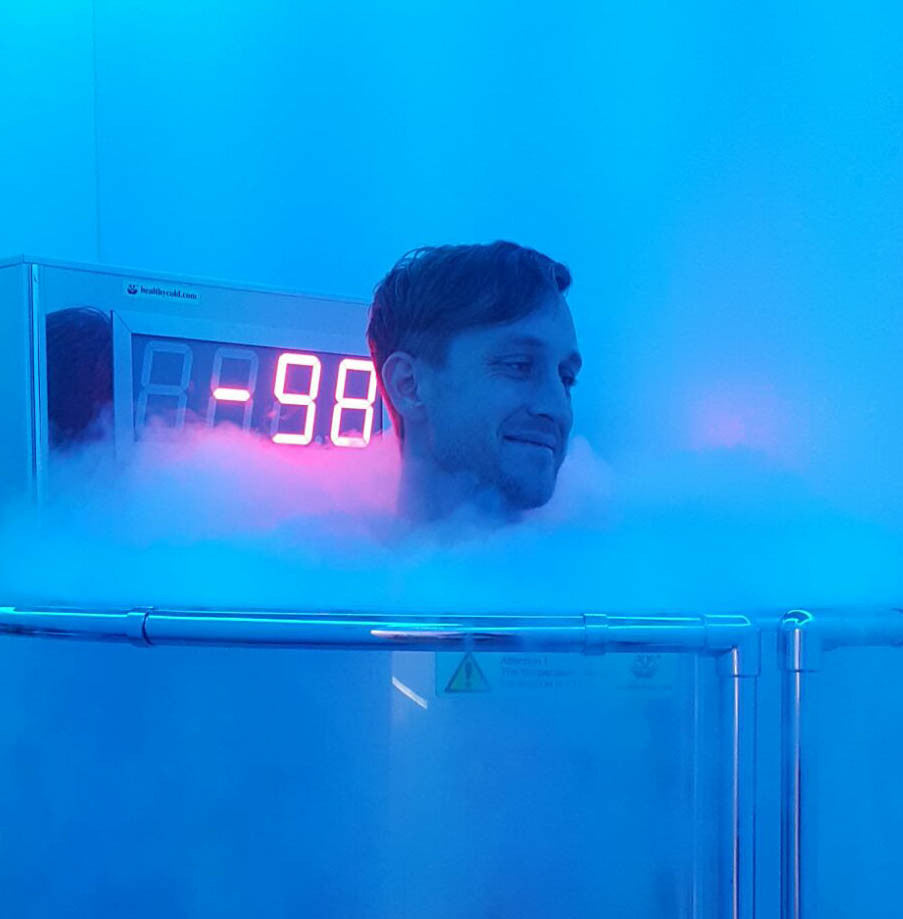 by
by